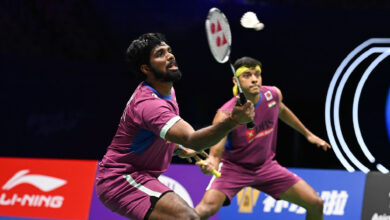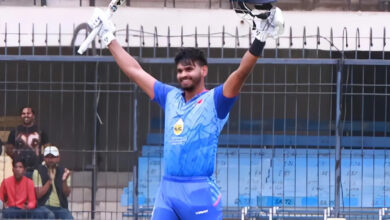How Indian bridge is tackling cheating concerns with ‘hybrid’ meets

A bunch of seniors with laptops or tablets slung from their shoulders made their way to designated ‘competition centres’ across five cities recently, where supervisors pacing the aisles kept an eye to ensure no cheating took place for the next few hours.
Bengaluru, Chennai, Madurai, Coimbatore and Coonoor would have been teeming with competitive examination centres all these years, for teens and graduates looking to pursue Masters and under-graduate professional courses. But in a pilot tournament – TVS Mobility R Ratnam Memorial Hybrid – in which more than 80 pairs participated, a multi-city online centre meet was conducted as ‘Hybrid Bridge’, to a fairly successful level.
Organiser Kalyan Mohan of Bengaluru, chuckled that he’s yet to hear murmurs alleging mischief from the usual ‘cheating- suspecting’ suspects – the voluble, outspoken amongst the bridge-playing community, which he considers a signal that the experiment worked. “Online bridge grew exponentially during the pandemic, and it’s perfect for elderly players who can’t keep travelling to different cities. But the only downside was that people were cheating online, and worse, the destructive constant doubt that ‘people can cheat’ that marred online bridge. With ‘Hybrid Bridge’, we could address those fears,” said the secretary of Karnataka Bridge Association, also a former techie, who now works with start-ups.
The Summer Nationals, one of India’s three big-prize money bridge events, received an underwhelming response this year in Bengaluru, prompting Mohan to innovate. He would collaborate with bridge players in Chennai, as they set about the logics at Catholic Club and Koramangala Club in Bengaluru, and Madras Gymkhana and Anna University Alumni Club in Chennai, where players walked in with their devices, and played bridge on the BBO (Bridge Base Online) platform, while invigilators ensured no eye-signalling and none of the tab-toggling could aid them in cheating.
Chess is in the middle of a cheating scandal at the highest echelon with world champion Magnus Carlsen and Hans Niemann involved in a standoff that has proven particularly tricky to resolve, with technology and online games inviting long-due regulatory oversight. Bridge is not prudish in admitting cheating does take place – and has a storied hory of face-to-face games where the yellow boards holding the cards would be famously placed at horizontal or vertical angles, the positions signalling a prior understanding. Online cheating is straightforward – one can call up a partner and discuss cards, husband-wife or father-son in the same house playing on different devices can easily trade notes, one can refer to system notes or simply use a separate device.
Innovative foul methods
A particularly clever method employed cheats in online bridge was through ‘kibitzing’ – log in through a second ID posing as a spectator, and view all the cards. The ‘Real Bridge’ software then installed audio and video for online games, but couldn’t police against accessing system notes. Bridge, that went online on a smaller niche scale in 2001, boasts of a fairly sophicated detailed forensic audit system where investigators can check bizarre bidding and card play patterns that flag high-probability suspicions of cheating. “Many self-confessed, or simply knew they were close to being caught. But the bigger problem was someone being unfairly accused owing to someone’s fancy of imagination, and then players believing everyone in online bridge is cheating. Hybrid was a golden mean,” says bridge director Arvind Vaidya of Mumbai.
The Summer Nationals, one of India’s three big-prize money bridge events, received an underwhelming response this year in Bengaluru. (Special arrangement)
A bigger factor was also the prohibitive costs involved in travelling to cities for tournaments and seniors’ reluctance to travel with Covid not fully gone. The online habit also had given players a taste of convenience, which meant a Coimbatore tournament got cancelled too. Hybrid was the way to go.
“We arranged bridge tables. But players played on their devices. Everyone playing North sat in one corner, those South, East, West in other corners, so no partner was visible. We invested in wi-fi and PowerPoints, and two supervisors roamed looking for cheating. The bridge decisions were adjudicated two directors in Chennai and one in Bengaluru,” Kalyan said.
Earlier in 2022, Delhi had hosted an international B-Fame Hybrid for Indians competing against other Asian and Middle-Eastern players.
Kalyan says the chess controversy had no bearing on bridge. “Bridge players know how to cheat, we don’t need to borrow from chess!” he laughed, adding the card game was quicker to address the stigma of online cheating and plug the gaps, though more might emerge.
The eventual plan is to develop a platform which is cheat-free (a few Indian techies involved), and developing cheap devices with just bridge uploaded that one can walk in and play on. It’s not that bridge players are more scrupulous, but at that age and standing in life, they are looking to get better at the game than they were yesterday, he says. Yet, the Hybrid centres had to be set up with ironically college students and young IT professionals serving as supervisors at this meet.







